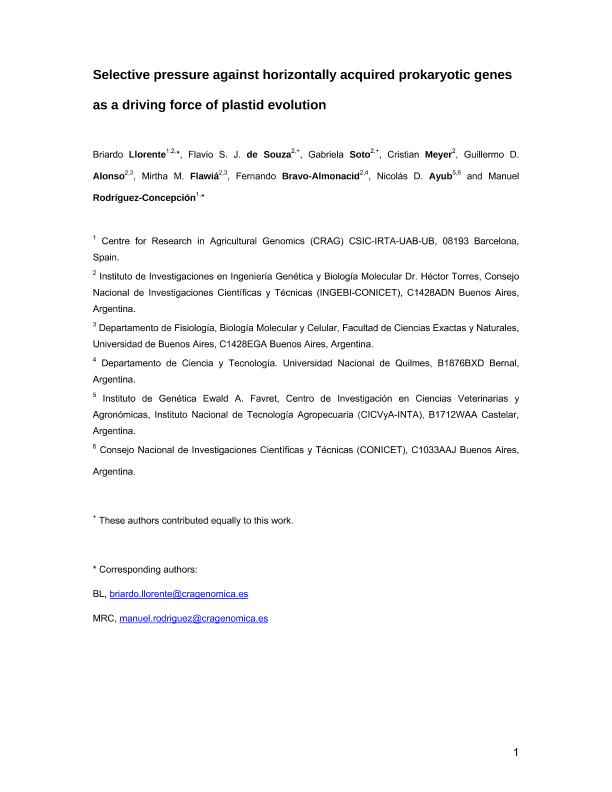Mostrar el registro sencillo del ítem
dc.contributor.author
Llorente, Briardo

dc.contributor.author
Silva Junqueira de Souza, Flavio

dc.contributor.author
Soto, Gabriela Cynthia

dc.contributor.author
Meyer, Cristian Germán

dc.contributor.author
Alonso, Guillermo Daniel

dc.contributor.author
Flawia, Mirtha Maria

dc.contributor.author
Bravo Almonacid, Fernando Felix

dc.contributor.author
Ayub, Nicolás Daniel

dc.contributor.author
Rodríguez Concepción, Manuel
dc.date.available
2018-05-10T17:25:15Z
dc.date.issued
2016-01
dc.identifier.citation
Llorente, Briardo; Silva Junqueira de Souza, Flavio; Soto, Gabriela Cynthia; Meyer, Cristian Germán; Alonso, Guillermo Daniel; et al.; Selective pressure against horizontally acquired prokaryotic genes as a driving force of plastid evolution; Nature Publishing Group; Scientific Reports; 6; 1903; 1-2016; 1-10
dc.identifier.issn
2045-2322
dc.identifier.uri
http://hdl.handle.net/11336/44776
dc.description.abstract
The plastid organelle comprises a high proportion of nucleus-encoded proteins that were acquired from different prokaryotic donors via independent horizontal gene transfers following its primary endosymbiotic origin. What forces drove the targeting of these alien proteins to the plastid remains an unresolved evolutionary question. To better understand this process we screened for suitable candidate proteins to recapitulate their prokaryote-to-eukaryote transition. Here we identify the ancient horizontal transfer of a bacterial polyphenol oxidase (PPO) gene to the nuclear genome of an early land plant ancestor and infer the possible mechanism behind the plastidial localization of the encoded enzyme. Arabidopsis plants expressing PPO versions either lacking or harbouring a plastid-targeting signal allowed examining fitness consequences associated with its subcellular localization. Markedly, a deleterious effect on plant growth was highly correlated with PPO activity only when producing the non-targeted enzyme, suggesting that selection favoured the fixation of plastid-targeted protein versions. Our results reveal a possible evolutionary mechanism of how selection against heterologous genes encoding cytosolic proteins contributed in incrementing plastid proteome complexity from non-endosymbiotic gene sources, a process that may also impact mitochondrial evolution.
dc.format
application/pdf
dc.language.iso
eng
dc.publisher
Nature Publishing Group

dc.rights
info:eu-repo/semantics/openAccess
dc.rights.uri
https://creativecommons.org/licenses/by-nc-sa/2.5/ar/
dc.subject
Plastid
dc.subject
Plant
dc.subject
Metabolism
dc.subject
Evolution
dc.subject.classification
Otras Ciencias Biológicas

dc.subject.classification
Ciencias Biológicas

dc.subject.classification
CIENCIAS NATURALES Y EXACTAS

dc.title
Selective pressure against horizontally acquired prokaryotic genes as a driving force of plastid evolution
dc.type
info:eu-repo/semantics/article
dc.type
info:ar-repo/semantics/artículo
dc.type
info:eu-repo/semantics/publishedVersion
dc.date.updated
2018-05-03T21:05:51Z
dc.journal.volume
6
dc.journal.number
1903
dc.journal.pagination
1-10
dc.journal.pais
Reino Unido

dc.journal.ciudad
Londres
dc.description.fil
Fil: Llorente, Briardo. Centre for Research in Agricultural Genomics; España. Consejo Nacional de Investigaciones Científicas y Técnicas. Instituto de Investigaciones en Ingeniería Genética y Biología Molecular "Dr. Héctor N. Torres"; Argentina
dc.description.fil
Fil: Silva Junqueira de Souza, Flavio. Consejo Nacional de Investigaciones Científicas y Técnicas. Instituto de Investigaciones en Ingeniería Genética y Biología Molecular "Dr. Héctor N. Torres"; Argentina
dc.description.fil
Fil: Soto, Gabriela Cynthia. Consejo Nacional de Investigaciones Científicas y Técnicas. Instituto de Investigaciones en Ingeniería Genética y Biología Molecular "Dr. Héctor N. Torres"; Argentina
dc.description.fil
Fil: Meyer, Cristian Germán. Consejo Nacional de Investigaciones Científicas y Técnicas. Instituto de Investigaciones en Ingeniería Genética y Biología Molecular "Dr. Héctor N. Torres"; Argentina
dc.description.fil
Fil: Alonso, Guillermo Daniel. Consejo Nacional de Investigaciones Científicas y Técnicas. Instituto de Investigaciones en Ingeniería Genética y Biología Molecular "Dr. Héctor N. Torres"; Argentina. Universidad de Buenos Aires. Facultad de Ciencias Exactas y Naturales. Departamento de Fisiología, Biología Molecular y Celular; Argentina
dc.description.fil
Fil: Flawia, Mirtha Maria. Consejo Nacional de Investigaciones Científicas y Técnicas. Instituto de Investigaciones en Ingeniería Genética y Biología Molecular "Dr. Héctor N. Torres"; Argentina. Universidad de Buenos Aires. Facultad de Ciencias Exactas y Naturales. Departamento de Fisiología, Biología Molecular y Celular; Argentina
dc.description.fil
Fil: Bravo Almonacid, Fernando Felix. Consejo Nacional de Investigaciones Científicas y Técnicas. Instituto de Investigaciones en Ingeniería Genética y Biología Molecular "Dr. Héctor N. Torres"; Argentina. Universidad Nacional de Quilmes. Departamento de Ciencia y Tecnología; Argentina
dc.description.fil
Fil: Ayub, Nicolás Daniel. Instituto Nacional de Tecnología Agropecuaria. Centro de Investigación en Ciencias Veterinarias y Agronómicas. Instituto de Genética; Argentina. Consejo Nacional de Investigaciones Científicas y Técnicas; Argentina
dc.description.fil
Fil: Rodríguez Concepción, Manuel. Centre for Research in Agricultural Genomics; España
dc.journal.title
Scientific Reports
dc.relation.alternativeid
info:eu-repo/semantics/altIdentifier/url/https://www.nature.com/articles/srep19036
dc.relation.alternativeid
info:eu-repo/semantics/altIdentifier/doi/http://dx.doi.org/10.1038/srep19036
Archivos asociados
